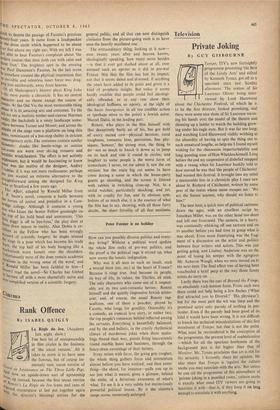Rank Offence
By ISABEL QUIGLY HE best bit of oneupmanship in film circles is the business of 'the uncut version.' All it takes to score is to have seen the famous, but of course im- mensely rare, uncut version of A (ed or Intolerance or The Three Little Pigs. tu‘nrd now an upside-down sort of upmanship up instead, because the first uncut version re, kenoir's La Regle feu (cans and cans of wiJecled masterpiece at last put together again th the director's blessing) arrives for the general public, and all that can now distinguish cineastes from the picture-going mob is to have seen the heavily mutilated one.
The extraordinary thing, looking at it now— over twenty years after and heaven knows, ideologically speaking, how many more besides —is that it ever got slashed about at all, ever aroused such an uproar as it did in pre-war France. Not that the film has lost its impact, not that it seems dated and dimmed; if anything the years have added to its point and given it a kind of prophetic insight. But today it seems hardly credible that people could feel ideologi- cally offended, or at any rate show their ideological huffiness so openly, at the sight of the haute bourgeoisie in all too credible action or (perhaps more to the point) a Jewish actor, Marcel Dalio, in the leading part.
Renoir, who plays in the film himself with that deceptively burly air of his, has got hold of every sacred cow—physical heroism, rural toughness, romantic love, patriotism, fine phy- siques, 'honour,' the strong man, the thing to do--not so much to knock it down as to jump on its back and ride it round in circles; and laughter to some people is the worst form of iconoclasm. I never, let me admit it, saw the cut version; but the main big cut seems to have come during a scene in which the house-party guests go shooting, and the screen is littered with rabbits in twitching close-up. Not, to a stolid watcher, particularly shocking; and yet, with its cruelty for fun, and its obvious sym- bolism of so much else, it is the essence of what the film has to say, showing, with all those furry deaths, the sheer frivolity of all that nastiness.
Peter Forster Is on holiday How can you possibly divorce politics and every- day living? Without a political word spoken the whole film reeks of pre-war politics, and the proof is the political rage it stirred up, what now seems the lunatic indignation.
Why was it all seen as such an insult, such a mortal blow (etc. etc.) at the heart of France? Because it . rings true. And because its people, its way of life, its values, the Thirties, all stink. The only characters who come out of it respect- ably are its two anti-romantic heroes: Renoir himself and the quietly impressive Jewish aristo- crat; and, of course, the usual Renoir rap- scallions, one of them a poacher, played by Carette, who longs for gentility. Ostensibly it's a comedy, an ironical love story, or rather two, the top people's romances behind reflected among the servants. Everything is beautifully balanced, and by the end balletic, in the crazily rhythmical climax of murderous jokes when three under- lings thread their way, pistols firing inaccurately round marble busts and banisters, through the fancy-dress cavortings of their betters.
Irony mixes with farce, the going gets tougher, the whole thing gathers force and momentum almost before you have noticed; and then some- thing—the shoot, for instance—pulls you up to see just what is meant, gives a glimpse, behind the smile, of a ferocious awareness of what's what. To see it is a very subtle but mysteriously powerful political lesson. By it the cinema's range seems immensely enlarged.














































 Previous page
Previous page